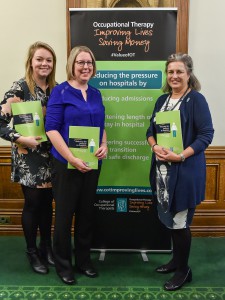 An innovative palliative therapy team run by Heart of England NHS Foundation Trust which utilises occupational therapists to help get patients home quicker, has been highlighted as an example of best practice in a major national report published this week
An innovative palliative therapy team run by Heart of England NHS Foundation Trust which utilises occupational therapists to help get patients home quicker, has been highlighted as an example of best practice in a major national report published this week
In the report, the College of Occupational Therapists highlights how occupational therapists can reduce hospital admissions and reduce discharge delays, cutting the time patients spend in hospital unnecessarily and saving valuable NHS resources.
The Macmillan Specialist Palliative Therapy team, which works across Heartlands, Good Hope and Solihull Hospitals, is highlighted as an example of best practice which could be adopted more widely.
The service was established two-and-a-half years ago and aims to facilitate the safe and timely discharge of patients to their preferred place of care, or indeed for terminal patients, their preferred place to die. It does this by establishing effective links with key stakeholders within the Trust and community settings such as hospices and community palliative care teams.
Occupational therapists support peoples’ ability to continue to take part in daily occupations and activities. They provide advice in falls prevention, arrange home adaptations and signpost patients to support services so they can manage once home.
Lucy Davies, occupational therapist in the Macmillan Specialist Palliative Therapy team at the Trust, said: “We were delighted to be asked to go down to Westminster with the College of Occupational Therapists and to be recognised for best practice. We strongly believe in what we do and the benefits it provides for our patients and the Trust.
“The patient and carer feedback we are receiving has been very encouraging and we are seeing what a positive impact our work can have on improving palliative care pathways, preventing avoidable admissions, reducing the length of inpatient stays and achieving preferred place of care at end of life.”
Julia Scott, chief executive at the College of Occupational Therapists, said: “The NHS is under considerable financial pressure. To make services sustainable in the long term it is vital that fewer people are admitted to hospital unnecessarily and those who are admitted stay no longer than they need to. I would encourage NHS Trusts and local authorities to look at valuable examples like this one that show how early intervention by occupational therapists can make a real difference to people’s lives whilst saving the NHS money.”
The College argues that a medical ‘fix’ is not enough for frail older people and that hospitals should follow the lead set by the Macmillan Specialist Palliative Therapy team of placing equal focus on patients’ needs for recovery and long term independence.
The Reducing the Pressure on Hospitals report from the College gives six key recommendations for change including the provision of occupational therapists in all rapid response and emergency care services, more occupational therapy within primary care to prevent frailty and falls-related hospital admissions and ‘out of hours’ service provision.






